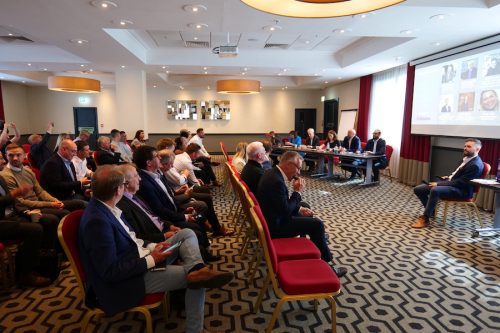Regional Revival: Tackling the challenges for Leeds City Region

Leeds city region has been building momentum over the last few years but as the 2020s have started and been marred by economic challenges and considerable uncertainty what does the future have in store for the region?

It was clear from the discussion there would be no simple answer but the event started by taking a look at a number of key areas, the economy on both a national and regional scale, transport and connectivity, the productivity challenge and housing.

Javid Patel
The session was opened by Javid Patel the head of public sector at Eddisons. He explained: “Leeds city region is a diverse polycentric economy which includes a number of major towns and cities. From my perspective it’s important that we don’t forget that we are a northern powerhouse and have one of the biggest economies outside of London.”
He added that he believes there is a real opportunity for the region to raise prosperity levels across the region and use its current position and the challenges it faces as a platform for further growth.
“There are huge amounts of work being done by the public and private sector to support the growth agenda and from Eddisons perspective we believe it’s about accelerating that growth more than anything else.”

Alex Golledge
Patel was followed by Alex Golledge the Bank of England’s Agent in Yorkshire and the Humber explained that the challenges facing the city region from an economic perspective were “largely the same challenges as those facing the national economy”
He noted that inflation was increasing and that many people “won’t have seen inflation like this for around 40 years”. In fact looking back over the last 25 years of central Bank independence, inflation has typically averaged around 2% and that “it’s just the last 9 months that it’s gone much higher”.
The reason for this increase he said is “a combination of a supply shocks and robust global demand for goods arriving at exactly the same time”, the most significant of which recently is the cost of energy and fuel. This in addition to a tight labour market and upward pay pressure is pushing up inflation.
He added that there are also “puzzles in the labour market” such as the amount of inactive labour vs pre-pandemic – c.500,000 people are currently inactive post pandemic. This he said has been caused by a number of reasons including people returning to education or people leaving the job market but he added “there’s a bit of a question mark over what explains the remainder “ However, with rising inflation he noted it is expected some of those inactive people will come back into the labour market.
Looking ahead, Golledge said that the Bank of England is expecting inflation to pick up further in the coming months, perhaps reaching 11% by Q4. The MPC would take the action necessary to return inflation to the 2% in the medium term but the scale, pace and timing of any further increases in Bank Rate would reflect the MPCs assessment of the economic outlook and inflationary pressures. The MPC would act forcefully if necessary.
“The Bank of England can’t solve the supply shocks to the global economy – raising rates won’t solve the energy crisis. But it will dampen the upward pressure on inflation that’s coming from the domestic economy, and help return inflation to target over the next few years.
Taking up the economic mantle from Golledge Eve Roodhouse, chief officer for culture and economy at Leeds City Council started by noting both Leeds as a city and the wider city region are “actually in a really strong position to be able to get through the economic reset” which was mentioned and is being experienced at present.

Eve Roodhouse
Roodhosue explained the city had to “watch out for some of things which will happen as a result” of what Golledge had said and that it’s crucial during a time like this for the city to have strong leadership in order to prevent “the situation that we [the city] ended up post the last recession, where inequality in the city grew – where those who were successful recovered well and those from more disadvantaged areas actually found themselves in a worse off position. ”
Justifying her view that Leeds was in “a good position to ride out the storm” Roodhouse noted that the city is on a roll in terms of making people understand “who we are as a city and what we bring as a place to organisations”. She cited the success in securing Channel 4’s nations and regions HQ, the UK Infrastructure Bank selecting the city for its base as well as the Financial Conduct Authority and the decision by Cognizant an international IT company to invest into the city.
But she said it’s not just about those businesses coming in, it’s about the homegrown successes which can be exported, the likes of Crisp which was recently acquired by a US tech company.
Returning however to the crucial areas the city needs to focus on to continue its trajectory she noted although unemployment in the city is reducing it is still almost 30% higher than pre Covid and there is a worrying trend in the number of people in work claiming Universal Credit that suggests “there’s an issue around increasing poverty”.
For Roodhouse who’s remit also covers the economy is excited about the opportunities which will come forward in 2023 when Leeds hosts it’s celebration of culture, she said one interesting trend post pandemic is in footfall.
Leeds station in one of the busiest rail stations in the country and during the week footfall is at c. 69% of the pre Covid baseline, however at weekends the metric is “really exceeding” the baseline. This she noted is also backed up by figures from the Leeds Hotel and Venues Association which reported that in the last 28 days occupancy rates were back to 2019 levels and there were lots of enquiries for 2024 around conferencing in the city.
The city, Roodhouse added, needs to be and plans to be agile and attentive which means that when businesses are investing in the city the council will go beyond just welcoming them but actually work proactively with employers to support them through programmes such as the digital careers festival in September in order to support an organisation success beyond just a warm welcome.
Roodhouse brought her slot to a close by reminding the audience however that the impact of the cost of living crisis and rising inflation can and is a physical one as she shared the story of a market worker in Leeds who because of the bus strikes was being forced to sleep on someone’s sofa because otherwise she couldn’t get to work.
She said: “So the impact of inflation and the discussion about wages for this individual was a sore neck and having to sleep on a sofa ever day just to be able to get to work and do her job – we need to remember these types of impact on people when we talk about these topics, when we get excited about the next investment and as we navigate these stormy seas!”

David Hoggarth
David Hoggarth, strategic rail director at Transport for the North (TfN) picked up the impact of transport for the economy noting it was TfN’s role to “set a strategic transport plan for the North [and] make sure that it is transport in the real world and transport delivering economic outcomes” which addresses the individual strengths of the North and looks to support their collective growth.
He noted that the organisation is about to start a refreshed economic review, in the wake of the Integrated Rail Plan published by government last year and TfN’s Decarbonisation Strategy for the North of England.
In fact net zero transport is a key aim for the body which is made up of both elected and business representatives. The role of both elected and business representatives Hoggath said is crucial as TfN’s remit also includes overseeing rail contracts in the region and he believes it’s crucial that these contracts provide “investment that’s generating growth” such as through providing new rolling stock to better improve journeys.
He added” The kind of power of the North coming together really with one voice and articulating the case is really what we’re about”. He also echoed Roodhouse’s point and said that sectors such as rail have to be agile enough to respond to changing demand as he noted commuter journeys may be lower but leisure journeys will be higher.
He finished by stating: ” We want a stronger voice for the North as part of that, but also a stronger voice for the Leeds City region and other areas through what we’re calling double devolution because we think these decisions need to be made at the lowest level possible with all that data and intelligence that comes up from local businesses and local authorities.”

Sarah Tulip
Sarah Tulip, Yorkshire chair of the Regional Productivity Forum who is also senior director at Cognizant which is planning to create 1,000 new jobs in the technology sector in Leeds.
She noted that productivity is cited as a key aim of Levelling Up but that it is also often misunderstood. “Many people confuse efficiency and productivity. Efficiency is doing the same with less to cut costs, whereas productivity is doing more by doing things differently through innovation and a culture of change.”
She noted that over the last few years organisations who have survived and thrived have been those that have focused on productivity rather than efficiency and took the time to innovate.
Tulip explained the crucial word when talking about innovation, transformation and productivity is “acceleration”.
“You can only accelerate if you understand your productivity and why is productivity important post pandemic? Well the more productive organisations are, the higher profits and wages, which in turn means higher tax revenues and public service investment. This means if businesses become more productive it can have an impact on healthcare, education and things that really matter to growing the region -there is a really far reaching potential.”

Amir Hussain
The importance of businesses and unlocking economic growth was picked up by Amir Hussain, CEO of YEME and deputy chair of the West Yorkshire Combined Authority’s housing, regeneration and place committee.
“Place regeneration and housing really brings together everything that has been discussed today and looks to channel it into something that is implementable. Housing unlocks the real opportunity.”
He explained that housing on its own is a real challenge and problem, he noted that the West Yorkshire mayor’s aim to deliver 5000 new affordable homes is fantastic but that if you consider it from a housebuilder’s perspective where those homes are to be delivered you would see 100% of affordable housing in areas of deprivation, which creates a “real risk that we’re building the slums of the future”.
So Hussain said that the way to make sure that housing becomes the solution rather than a problem is to “understand the place”. That he says means knowing “what creates a place that people want to live in”.
He explained that currently across Leeds city region there are hot and cold spots of development and that as much as Levelling Up refers to the north/south divide, within the region there is an issue of disparity.
“There are places where it’s commercially viable to deliver really high quality accommodation in places that people want to live and these can be fulfilled in a really vibrant, animated and experiential place. There’s other parts of the region where the end value of whatever you build there is less than what it cost to build it, which basically means you either end up with poor quality stuff that essentially drives down the situation in those places or we end up with lots of derelict empty properties. ”
So for Hussain the aim is to create places that will unlock the potential of something long term and hopefully achieve a balance across the whole region.
The barrier to this is the finance. He said the challenge is in changing perceptions as at present “anybody who delivers a development is expecting to make X percentage on completion. This model basically blows out of the water all of those places that are struggling. But if you could achieve your profit and viability over a 10,15 or 20 year cycle well then developers can take a very different view”.
The key to this is ensuring people will want to live there in later periods and means you have to tie in the development to a cultural strategy, skills strategy and transport strategy.
“We’ve got to ensure that there is an environment where people think that if they were to invest in these places today, with the kind of contextual issues that those places have, that they can be confident that over a period of time they’re going to achieve something that will be an uplifting, in terms of its value, its viability, but also in terms of its placemaking capabilities”
Hussain added that this however isn’t a solution that can be done solely by the public sector, and that ” there’s a massive role for the private sector” because local authorities aren’t best placed on their own to deliver this.
He concluded: “I think that taking a holistic view of a place and understanding what those opportunities are, in relation to particular sites in particular opportunities means that we can start to consolidate activity around different things whether it be transport, the connection through Bradford – which must happen – or other areas. But ultimately I think it’s about coming together, private sector, volunteers, and the public sector both Combined Authority and local authorities to shape things to deliver something different that results in economic growth.”
It was clear from the discussion in the room that although there are challenges facing the regional as well as the national economy, those based here remain optimistic about the future and that the Yorkshire can-do attitude means that the leaders in public and private sector are looking at how to innovate in their approaches to deliver upon the region’s economic potential.








